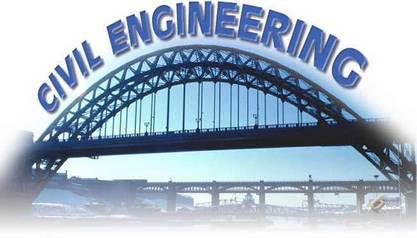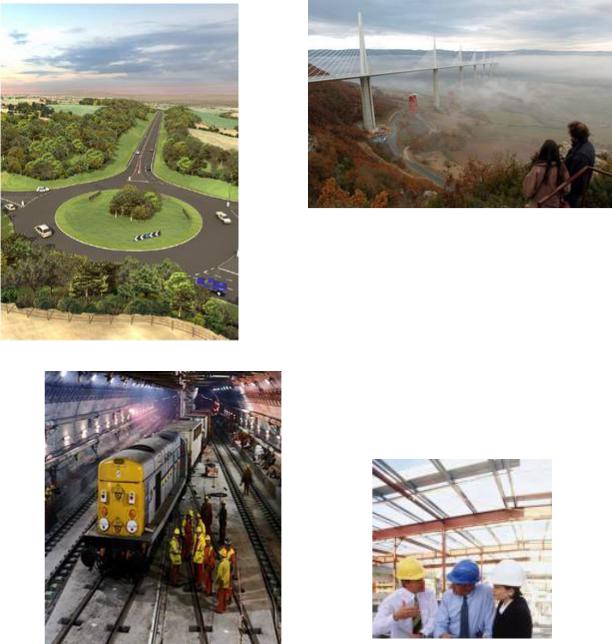
Английский язык.Civil Engineering
.pdfМинистерство образования и науки Российской Федерации Федеральное государственное бюджетное образовательное учреждение высшего профессионального образования žКузбасский государственный технический университет имени Т. Ф. Горбачева¤
И. В. Батенко, А. Л. Ефимова, Т. В. Кочина, И. Б. Шестакова
Civil Engineering (Гражданское строительство)
Рекомендовано учебно-методической комиссией направления подготовки 270800.62 žСтроительство¤
в кчестве электронного учебного пособия
Кемерово 2012
Рецензенты:
Чадина Л. К. – старший преподаватель кафедры иностранных языков
Угляница А. В. – председатель учебно-методической комиссии направления подготовки 270800.62 žСтроительство¤
Батенко Ирина Владимировна, Ефимова Альбина Леонидовна, Кочина Татьяна Владимировна, Шестакова Ирина Борисовна. Civil Engineering (Гражданское строительство): учебное пособие [Электронный ресурс] по английскому языку для студентов направления подготовки 270800.62 žСтроительство¤ очной формы обучения / И. В. Батенко, А. Л. Ефимова, Т. В. Кочина, И. Б. Шестакова. – Электрон. дан. – Кемерово: КузГТУ, 2012. – 1 электрон. опт. диск (CD-ROM); зв. ; цв. ; 12 см. – Систем тре-бования : Pentium IV ; ОЗУ 8 Мб ; Windows 2003 ; (CD-ROM-дисковод) ; мышь. – Загл. с экрана.
Учебное пособие содержит комплекс заданий с учетом профессиональных интересов обучаемых и соблюдением принципа междисциплинарности обучения. Выбор тем коммуникации обусловливается возможностью формирования на их основе навыков и умений, лежащих в основе развития навыков профессионально-ориентированного иноязычного общения. Предназначено для развития профессионально-коммуникативных умений у студентов направления 270800.62 “Строительство”. Рекомендуется для подготовки студентов к профессиональноориентированному иноязычному общению. Может быть, полезно аспирантам в сфере иноязычной профессиональной коммуникации
КузГТУБатенко И. В.
Ефимова А. Л.Кочина Т. В.
Шестакова И. Б.
1
Предисловие
Данное пособие предназначено для студентов направления подготовки 270800.62 žСтроительство¤, изучающих английский язык
Основная цель пособия состоит в том, чтобы подготовить студентов к чтению оригинальной литературы по специальности на английском языке.
Пособие состоит из 3 блоков: Civil Engineering (составители Батенко И. В., Кочина Т. В.), Water Supply and Water Disposal (составитель Батенко И. В.), Road and Bridge Construction (составители Ефимова А. Л., Шестакова И.Б.).
Каждый блок включает тексты для ознакомительного, изучающего и просмотрового чтения. Для работы над текстами предлагаются лексические упражнения, способствующие отработке специальной и научной лексики и овладению ею на уровне словосочетания, а также устные и письменные коммуникативные упражнения. Послетекстовые задания основаны на информации прочитанных текстов. Предусмотрены задания для групповой, парной и индивидуальной работы. Лексический состав методических указаний соответствует современному состоянию английского языка научнотехнического стиля.
2
Basic Facts about Building
Unit I: Civil Engineering
1.1 Read, study and try to memorize words and word combinations:
apply, syn. use, utilize civil engineering contribute
ensure experience explore influence involve large-scale
purpose, syn goal, aim receive
scope sewerage supervise supply surround work out
применять, использовать гражданское строительство содействовать, делать вклад
обеспечивать, гарантировать опыт
исследовать, изучать влиять, влияние вовлекать, включать крупномасштабный цель получать
кругозор, сфера деятельности канализационная сеть наблюдать, контролировать снабжать, обеспечивать окружать разрабатывать
1.2 Translate the international words:
profession, practice, civil, project, construction, military, topographical, location, design, forts, docks, discipline, canals, dams, drainage, irrigation, system, nation, standard, term, activity, municipal, specifications, general, office blocks, hydro-electrical, architecture, region, protection, structure, plan, classification, to classify, role, technique, airport, urban, steel, cement, factors, basic, principle, to reflect, social, communication, infrastructure.
3
1.3 Find the equivalents. Match A with B.
A |
|
B |
1. forces of nature |
1. |
диапазон инженера- |
|
строителя |
|
2. pure and applied science |
2. |
подразделяться на … |
3. to be subdivided into |
3. |
силы природы |
4. the scope of civil engineering |
4. |
чистая и прикладная наука |
5. to work out plans and |
5. |
гарантировать качество, |
specifications |
эффективность, скорость и |
|
|
низкую стоимость |
|
|
строительства |
|
6. to ensure quality, efficiency, |
6. |
рассматривать метод, |
speed and low cost of construction |
оборудование и материалы |
|
7. to consider the method, |
7. |
разрабатывать планы и |
equipment and materials |
спецификации |
|
8. вносить вклад в |
8. professional training |
|
здравоохранение, безопасность |
|
|
и уровень жизни |
|
|
9. проектирование зданий и |
9. efficient use of the materials |
|
сооружений |
|
|
10. наблюдать за |
10. to be planed and designed by |
|
строительством объектов |
civil engineers |
|
11. градостроительство |
11. to supervise the construction |
|
|
projects |
|
12. профессиональная |
12. to build the world’s |
|
подготовка |
infrastructure |
|
13. быть спланированным и |
13. to contribute to the public’s |
|
спроектированным инженером- |
health, safety and standard of |
|
строителем |
living |
|
14. эффективное использование |
14. structural engineering |
|
материалов |
|
|
15. строить мировую |
15. municipal engineering |
|
инфраструктуру |
|
|
4

1.4 Read the text given below and answer the following questions:
1.What is engineering?
2.How did the term “civil engineer” appear?
3.What field of construction activity does civil engineering comprise?
4.What are the duties of a civil engineer?
Engineering is a term applied to the profession in which a knowledge of the mathematical and natural sciences, gained by study, experience, and practice, is applied to the efficient use of the materials and forces of nature. Engineers are those who have received professional training in pure and applied science.
Before the middle of the 18th century, large-scale construction work was usually placed in the hands of military engineers. Military engineering involved such work as the preparation of topographical maps, the location, design, and construction of roads and bridges; and the building of forts and docks. In the 18th century, however, the term civil engineering came into use to describe engineering work that was performed by civilians for nonmilitary purposes.
Civil engineering is the broadest of the engineering fields. It contributes in more ways than any other engineering discipline to our modern society. Nearly everything that surrounds us has been planed and designed by civil engineers. Today the scope of civil engineering is subdivided into:
-structural engineering ( all kinds of buildings),
-highway and railway engineering,
5

-hydraulics engineering (canals, dams, drainage and irrigation systems),
-municipal engineering (city planning, traffic regulation, water supply and sewerage).
As for the duties of a civil engineer, they are:
-to work out plans and specifications,
-to supervise the construction projects,
-to ensure quality, efficiency, speed and low cost of construction,
6

- to consider the method, equipment and materials to be used to construct a project.
Now you understand that civil engineers build the world’s infrastructure. In doing so, they quietly shape the history of nations around the world. Most people can not imagine life without the many contributions of civil engineers to the public’s health, safety and standard of living. Only by exploring civil engineering’s influence in shaping the world we know today, we can creatively envision the progress of our tomorrows.
1.5 Mind the difference between the terms. Match A with B.
A |
|
|
B |
|
|
building |
is |
connected |
mainly |
with |
|
|
domestic |
dwellings such |
as |
||
|
houses, |
schools, |
hospitals |
and |
|
|
offices |
|
|
|
|
construction |
is concerned with erection and |
||||
|
repair of all types of buildings, |
||||
|
roads, bridges and other structures |
||||
civil engineering |
deals |
with surrounding features |
|||
|
like bridges, roads, harbors, water |
||||
|
supply |
and |
hydro-electric |
||
|
schemes |
|
|
|
|
7
1.6 Act out dialogues.
My faculty and my subject
-Would you introduce yourself?
-Of course. I’m a second-year student. My subject is construction.
-Oh? Are you from the KSTU?
-Yes, I’m. I study at the Faculty of Building and Underground Construction.
-Will you speak about your faculty?
-Our faculty was founded in 1978. Nowadays about 800 students study there. The staff comprises about 100 lecturers and researchers.
-I see. Thank you.
Choice of a specialty
-You study to be a civil engineer, don’t you?
-That’s right.
-Why have you chosen this profession?
-Because I take after my parents. My father and mother graduated from the Kuzbass Polytechnic many years ago. They like their job. I think civil engineering is important and interesting. And what about you?
-As for me, I enjoy solving problems and putting my ideas into action. Moreover I am curious about how things work and how to make them better.
-Then, I think civil engineering may be the perfect career for
you!
Civil Engineering
-What is civil engineering?
-Civil engineering is a very broad professional field.
-What are the areas of civil engineering interests?
-Civil engineering deals with the construction of different kinds of buildings, renewal and development projects, transport systems, water supply and waste disposal systems, dams and other coastal protection structures, off-shore facilities, flood and pollution-control
8

systems.
-I see. Nearly everything around us is planned, designed and constructed by a civil engineer.
-Yes, you are right.
The duties of a civil engineer
-What are you?
-I am a student.
-What is your subject?
-My subject is Civil engineering.
-Do you know what the duties of a civil engineer are?
-A civil engineer is to work out plans and specifications, to supervise the construction projects, to ensure quality, efficiency, speed and low cost of construction. And, of course, he considers the methods, equipment and materials to be used to construct a project.
-I see. To my mind the duties of a civil engineer are very important.
1.7Civil Engineers have to do more than one task for the successful completion of the project and this video deals with many important aspects. Click here, watch video and comment on it!
http://www.engineeringcivil.com/video-describing-job-of-a- civil-engineer.html
9
